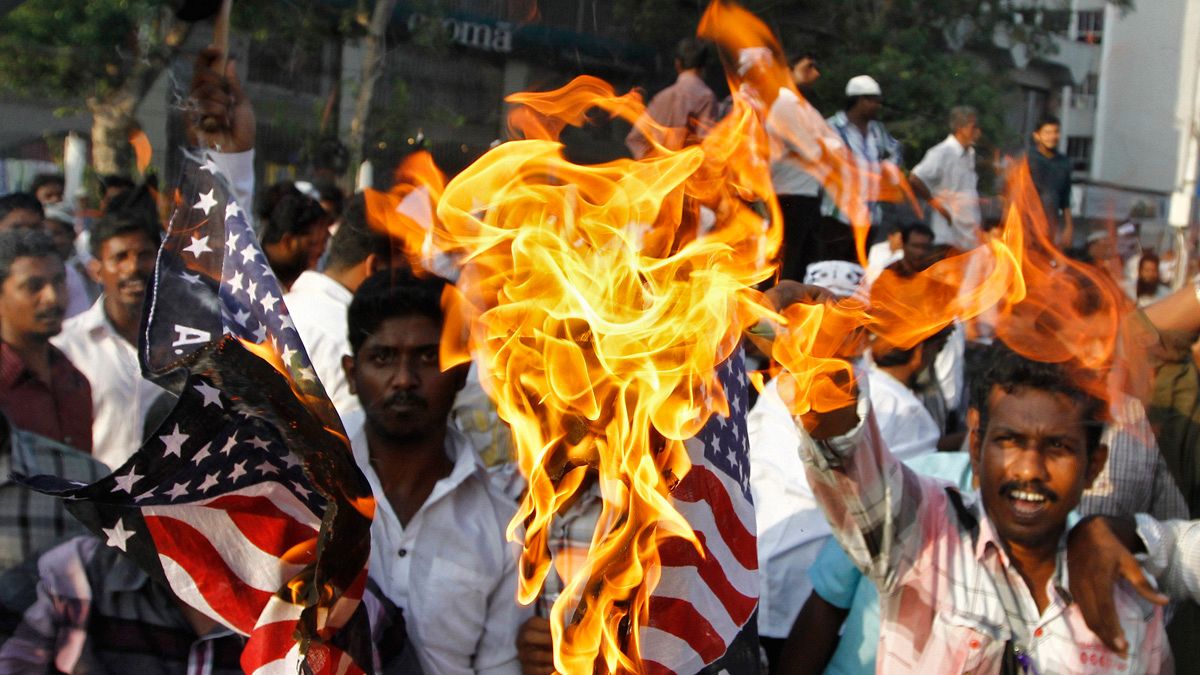Questions about American policy failure to advance Israeli-Palestinian peace and the Arab Spring have grown increasingly harsh with the Muslim backlash against the anti-Mohammed film ‘Innocence of Muslims’ made independently in the US.
The anti-American violence whipping across the world has people asking: did President Obama go at Mideast foreign policy with the vigour many believe it deserves?
As the remains arrived home of the ambassador murdered in Libya by a group claiming to be avenging insults against the Prophet Mohammed, Secretary of State Hillary Clinton could not contain her revulsion.
Clinton said: “The people of Egypt, Libya, Yemen and Tunisia did not trade the tyranny of dictator for the tyranny of a mob.”
Last year, Tunisians were the first to rebel against dictatorship – their President Ben Ali – and demand democratic rule. Yet since he retired, the foremost voices in the region, following the spreading of what was dubbed the Arab Spring, have been not pluralist but Islamist.
Our Washington correspondent spoke with a veteran foreign affairs consultant, a former advisor to the US State Department.
Aaron Miller, with the Woodrow Wilson Center, said: “The broader background is going to continue: rising anti-Americanism, Islamists who are both extremists and centrists, who have captured the agenda in these countries and governments who are very uncertain about how to conduct themselves in the face of these challenges. We are in for a very wild ride for the next several years.”
But Barack Obama’s election as president four years ago started well; it waved optimism over the wounds opened up between the US and Muslim countries by the Iraq War and other conflicts. Remember his reaching out speech in Cairo.
Obama said: “Partnership between America and Islam must be based on what Islam is, not what it isn’t. And I consider it part of my responsibility as President of the United States to fight against negative stereotypes of Islam wherever they appear.”
However, America’s influence over the Muslim world failed to crystallise.
The Director of Research at the Brookings Institution, Michael O’Hanlon, said Obama now is about as loved as his predecessor: “The broader Islamic world is not enthralled by Obama anymore. His popularity levels there are comparable to George Bush’s levels there. And many of the tactics that have been employed in pursuit of this effort have not panned out the way we hoped.”
The hope was that moderates could be brought to the negotiating table. But the venom of Israeli-Palestinian dealings remained, Israel was alienated, and huge portions of Muslim public opinion towards the US remain as caustic as they ever were.
We asked anthropologist and specialist on Islam and the Arab world Malek Chebel for his interpretation of the anger inflaming the Muslim world.
Sophie Desjardin, euronews: It all started with the film ‘Innocence of Muslims’, which mocks the Prophet Mohammed. We see in the international media references to these demonstrations being anti-Western; are these violent reactions to do with the film or are they about the West?
Malek Chebel: There is an anti-Western feeling, I can’t hide that, and it goes back a long way. It goes all the way back to the Crusades and up to the present, with a relatively moderate manipulation of information, which isn’t always visible, from some small groups in America and Europe who actively want to abolish or tarnish Islam in the broad sense, in an indistinct manner. Evidently, this feeling exists, not counting America in particular, the US presence in Afghanistan and Iraq, somewhat in Pakistan and the Middle East. This keeps up the bad feeling and dislike of America in the whole Arab region. And thirdly, I’d say the speech Barack Obama gave in Cairo wasn’t followed up with action, it’s the least we can say, therefore exacerbating suspicion that Arabs and Muslims in general have for America.
euronews: So it’s essentially an anti-American feeling?
Chebel: I think it’s mostly anti-American. Evidently the West, which is naturally allied with the Americans, pays the price as well, the collateral cost. But I don’t think the Arabs have anything against France, Italy, Spain or Greece. In the end they’re essentially baring their teeth at America.
euronews: Comparing Egypt or Libya, which went through the Arab spring, with others like Pakistan or Malaysia, the situation is very different, and yet the same flags are burned, you hear the same slogans. What is the common denominator between these countries?
Chebel: At the beginning we thought it was the countries that went through the Arab Spring: Tunisia, Libya, Egypt and Yemen. We thought that the Muslim countries in Asia, Muslim but not Arab, weren’t concerned. But the Shi’ites, such as in Lebanon for example, called for demonstrations. This is a problem growing out of an Arab base, since the Prophet is Arab and because the Arab world is very agitated, translating into a Muslim problem. Asia participated, as I’ve said since the start, with key elements being Pakistan and Afghanistan. So it has all taken on a Muslim dimension, and therefore a worldwide dimension. From there, a lot of things can happen.


